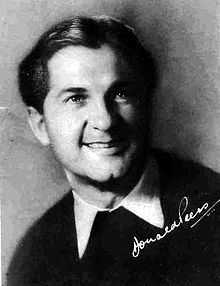Donald Peers

Donald Peers (10 July 1908 – 9 August 1973) was a popular Welsh singer. His best remembered rendition and signature song was "In a Shady Nook by a Babbling Brook".
Biography
He was born Donald Rhys Hubert Peers in the Welsh mining town of Ammanford. His father was a colliery worker and a prominent member of the Plymouth Brethren who disapproved of the variety theatre, and never heard or saw his son work. Donald's family were hoping he would become a schoolteacher, but he had other ambitions and left home at the age of sixteen to live his life elsewhere.
Donald travelled around the country working as a house painter and, for a time, went to sea as a mess steward on ships. He met his wife in 1930 in Richmond, North Yorkshire and they had a daughter Sheila in 1931. He joined a dance band as a singer and continued his day job as a painter. His first BBC Radio broadcast took place on 17 December 1927, with the popular comedy duo, Clapham and Dwyer. One of his songs he sang was, "In a Shady Nook by a Babbling Brook", which became his most requested song and, later, his signature tune. His London debut took place in a revue at the Bedford Theatre in 1929. He struggled on until 1933 when, after an appearance on the BBC Music Hall programme, he got a recording contract with HMV Records.
In 1940 Donald enlisted in the Royal Army Service Corps as a clerk, where he served until D-Day in 1944, when he was invalided out. When in service, he entertained his fellow troops in shows. In 1944 he recorded "In a Shady Nook by a Babbling Brook", written by E.G. Nelson and Harry Pease in 1927. Other 1940s recordings included "I Can't Begin To Tell You", "Bow Bells", "Far Away Places", "On The 5.45" (a vocal version of "Twelfth Street Rag", with lyrics by Andy Razaf), "Powder Your Face With Sunshine" (one of his biggest successes), "Lavender Blue (Dilly Dilly)", "A Strawberry Moon (In A Blueberry Sky)", "Everywhere You Go", "Clancy Lowered the Boom", "It Happened in Adano", "A Rose in a Garden of Weeds", "I'll String Along with You" and "Down in the Glen".
He toured in variety, building up quite a following in the provinces, and, in 1948, after a big break on BBC Radio, became a West End star. Henry Hall booked him with Billy Russell and Norman Wisdom for a new show called Buttons & Bows in 1949 and, in the same year, he performed his one-man show at the Royal Albert Hall and the London Palladium.[1] Peers appeared in the 1950 Royal Variety Performance. He was given his own radio show, Cavalier of Song, and had hits with, "On a Slow Boat to China". At the height of his fame he was receiving 3,000 fan letters a week.[citation needed] In the early 1960s Peers was given his own television programme, Donald Peers Presents, and, in that programme, he introduced Tom Jones and also scientist and writer Brian J. Ford, this time playing boogie piano.
He appeared in several films[2] including, String Along With Me, and continued recording with songs such as, "The Last Mile Home", "Dear Hearts and Gentle People", "Out of a Clear Blue Sky", "Music! Music! Music!", "If I Knew You Were Comin' I'd've Baked a Cake", "Enjoy Yourself (It's Later Than You Think)", "Dearie", "I Remember the Cornfields", "Beloved, Be Faithful", "Me and My Imagination", "Mistakes", "In a Golden Coach" (a celebratory number for the Coronation of Queen Elizabeth II), "Is It Any Wonder" and "Changing Partners".
After several years at the top Peers left for Australia, where he stayed for two years. When he returned to the UK, his fans had all but forgotten him and he had to work back to stardom via the club circuit, which had taken over from the variety theatres. He made a comeback with "Please Don't Go", which reached #3 in the UK Singles Chart in 1969.[3] Eddy Arnold had pop and country success with his cover version, the melody extracted from 'Tales Of Hoffman'. This was followed by a string of singles and albums by Peers, but it was not until 1972 that he had another hit with "Give Me One More Chance", which reached the UK Top 40.[3]
Peers died in a Hove nursing home on 9 August 1973 at the age of 65, with The Brighton & Hove Gazette announcing his demise. He was cremated in the Downs Crematorium, Brighton. His memorial tablet in the Garden of Remembrance is weather-beaten and reads, 'Donald Peers, August 1973, Loved by Kates, "In a Shady Nook by a Babbling Brook"'.
References
Bibliography
- Pathway by Donald Peers, the autobiography (Werner Laurie, 1951)
- The Wireless Stars by George Nobbs (Wensum Books, 1972)
- British Music Hall - An Illustrated Who's Who from 1850 to the Present Day by Roy Busby (Paul Elek, 1976)
External links
|